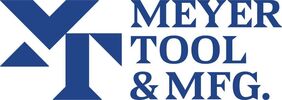Call: 708-425-9080
A machinist's dream realized
Jason Freeman
Southtown Star, November 20, 2008
Southtown Star, November 20, 2008
Eileen Cunningham believes that her father, Frank Meyer, was living proof that anyone can take a small home business and turn it into a multimillion-dollar corporation with an immense presence on the world stage.
"He was kind of a high-energy guy who was always up for a good challenge," she said.
In 1966, just three years before being laid off from his job as a machinist at Argonne National Laboratory, Meyer started his own company—a machine shop called Meyer Tool & Manufacturing Inc., which he operated out of his Evergreen Park garage.
Meyer wanted his new company to eventually become an industrial supplier to provide the complex and high-quality products needed to support scientific research and development, Cunningham said.
"He always believed that if you can machine one thing, you can machine anything," she said. "He always said, 'Just give me the drawings, and I can build it.'"
Today, Meyer Tool—which operates out of a plant at 4601 Southwest Highway in Oak Lawn and employs dozens of machinists, engineers and fabricators - has realized Frank Meyer's dream by specializing in the design and manufacture of cryogenic, vacuum and pressure equipment for scientific and commercial applications.
Over the years, Meyer Tool has helped create prototypes and unique systems, subsystems, assemblies and components such as aluminum vacuum chambers, pressure vessels, instruments for galactic surveys, custom cryostats and cryogenic storage chambers for companies and government labs around the world including Argonne, Thomas Jefferson National Lab, Fermilab and the National Ignition Facility.
"It's not your father's manufacturing anymore," said Cunningham, who took over as president of the company after her father died in 2006. "It's really high-tech...and not just a dead-end, push-the-same-button-all-day-long kind of job at all."
Recently, Meyer Tool fabricated 12 distribution boxes for the Large Hadron Collider in Geneva, Switzerland, that powers the electron beam that goes through a particle accelerator.
"We're always getting to do the latest stuff because people know we can build someone's designs," Cunningham said. "If they can think it and can give us an etched-out design on a napkin, we can make it."
Meyer Tool has equipment installed in scientific installations across the United States, in Europe and in Asia, said Edward C. Bonnema, vice president of operations.
"There are all sorts of little companies and big companies supplying these cutting-edge things that no one ever thinks about," he said.
Bonnema said Meyer Tool and other companies like it will thrive in the coming years.
"Manufacturing is not dead in the United States," he said. "Politicians like to pretend we're going to a service economy, but if everybody's selling shoes at Wal-Mart, who's going to buy them?"
"There are careers in manufacturing that offer viable jobs," Cunningham said. "There are great career pathways out there where you can be creative and innovative and where you have to be technically competent. Everybody wants to go get that business degree, but there's a whole world out there that some people don't really get exposed to anymore."
"He was kind of a high-energy guy who was always up for a good challenge," she said.
In 1966, just three years before being laid off from his job as a machinist at Argonne National Laboratory, Meyer started his own company—a machine shop called Meyer Tool & Manufacturing Inc., which he operated out of his Evergreen Park garage.
Meyer wanted his new company to eventually become an industrial supplier to provide the complex and high-quality products needed to support scientific research and development, Cunningham said.
"He always believed that if you can machine one thing, you can machine anything," she said. "He always said, 'Just give me the drawings, and I can build it.'"
Today, Meyer Tool—which operates out of a plant at 4601 Southwest Highway in Oak Lawn and employs dozens of machinists, engineers and fabricators - has realized Frank Meyer's dream by specializing in the design and manufacture of cryogenic, vacuum and pressure equipment for scientific and commercial applications.
Over the years, Meyer Tool has helped create prototypes and unique systems, subsystems, assemblies and components such as aluminum vacuum chambers, pressure vessels, instruments for galactic surveys, custom cryostats and cryogenic storage chambers for companies and government labs around the world including Argonne, Thomas Jefferson National Lab, Fermilab and the National Ignition Facility.
"It's not your father's manufacturing anymore," said Cunningham, who took over as president of the company after her father died in 2006. "It's really high-tech...and not just a dead-end, push-the-same-button-all-day-long kind of job at all."
Recently, Meyer Tool fabricated 12 distribution boxes for the Large Hadron Collider in Geneva, Switzerland, that powers the electron beam that goes through a particle accelerator.
"We're always getting to do the latest stuff because people know we can build someone's designs," Cunningham said. "If they can think it and can give us an etched-out design on a napkin, we can make it."
Meyer Tool has equipment installed in scientific installations across the United States, in Europe and in Asia, said Edward C. Bonnema, vice president of operations.
"There are all sorts of little companies and big companies supplying these cutting-edge things that no one ever thinks about," he said.
Bonnema said Meyer Tool and other companies like it will thrive in the coming years.
"Manufacturing is not dead in the United States," he said. "Politicians like to pretend we're going to a service economy, but if everybody's selling shoes at Wal-Mart, who's going to buy them?"
"There are careers in manufacturing that offer viable jobs," Cunningham said. "There are great career pathways out there where you can be creative and innovative and where you have to be technically competent. Everybody wants to go get that business degree, but there's a whole world out there that some people don't really get exposed to anymore."



